- Home
- Simon Kernick
The Business Of Dying
The Business Of Dying Read online
The Business
of Dying
Simon Kernick
CORGI BOOKS
Contents
Cover
Title
Copyright
Dedication
About the Author
Also by Simon Kernick
Introduction
Part One: Introducing the Dead
Chapter 1
Chapter 2
Chapter 3
Chapter 4
Chapter 5
Chapter 6
Chapter 7
Part Two: Hunting the Living
Chapter 8
Chapter 9
Chapter 10
Chapter 11
Chapter 12
Chapter 13
Chapter 14
Chapter 15
Chapter 16
Chapter 17
Chapter 18
Part Three: Unravelling
Chapter 19
Chapter 20
Chapter 21
Chapter 22
Chapter 23
Chapter 24
Chapter 25
Chapter 26
Chapter 27
Chapter 28
Chapter 29
Part Four: The Business of Dying
Chapter 30
Chapter 31
Chapter 32
Chapter 33
Chapter 34
Chapter 35
Chapter 36
Chapter 37
Chapter 38
Chapter 39
Epilogue
A Good Day to Die
Before
Part One: Mindoro Island, Philippines
Chapter 1
Chapter 2
This eBook is copyright material and must not be copied, reproduced, transferred, distributed, leased, licensed or publicly performed or used in any way except as specifically permitted in writing by the publishers, as allowed under the terms and conditions under which it was purchased or as strictly permitted by applicable copyright law. Any unauthorised distribution or use of this text may be a direct infringement of the author’s and publisher’s rights and those responsible may be liable in law accordingly.
Version 1.0
Epub ISBN 9781407084350
www.randomhouse.co.uk
TRANSWORLD PUBLISHERS
61-63 Uxbridge Road, London W5 5SA
A Random House Group Company
www.rbooks.co.uk
THE BUSINESS OF DYING
A CORGI BOOK: 9780552157377
First published in Great Britain in 2002 by Bantam Press a division of Transworld Publishers Corgi edition published 2003 Corgi edition reissued 2008
Copyright © Simon Kernick 2002
Simon Kernick has asserted his right under the Copyright, Designs and Patents Act 1988 to be identified as the author of this work.
This book is a work of fiction and, except in the case of historical fact, any resemblance to actual persons, living or dead, is purely coincidental.
A CIP catalogue record for this book is available from the British Library.
This book is sold subject to the condition that it shall not, by way of trade or otherwise, be lent, resold, hired out, or otherwise circulated without the publisher’s prior consent in any form of binding or cover other than that in which it is published and without a similar condition, including this condition, being imposed on the subsequent purchaser.
Addresses for Random House Group Ltd companies outside the UK can be found at: www.randomhouse.co.uk The Random House Group Ltd Reg. No. 954009
The Random House Group Limited supports The Forest Stewardship Council (FSC), the leading international forest certification organisation. All our titles that are printed on Greenpeace approved FSC certified paper carry the FSC logo. Our paper procurement policy can be found at www.rbooks.co.uk/environment
Typeset in 10.5/13pt Palatino by Falcon Oast Graphic Art Ltd.
Printed in the UK by CPI Cox & Wyman, Reading, RG1 8EX.
2 4 6 8 1 0 9 7 5 3 1
For Sally
Simon Kernick lives near London and has two young children. His novels, The Business of Dying, The Murder Exchange, The Crime Trade, A Good Day to Die, Relentless (selected as a Richard & Judy Summer Read) and Severed are available as Corgi paperbacks. His new novel, Deadline, will be published in July 2008.
The research for Simon Kernick’s novels is what makes them so authentic. His extensive list of contacts in the police force has been built up over more than a decade. It includes long serving officers in Special Branch, the National Crime Squad (now SOCA), and the Anti-Terrorist Branch, all of whom have plenty of tales to tell.
For more information on Simon Kernick and his books, see his website at www.simonkernick.com
www.rbooks.co.uk
Also by Simon Kernick
THE BUSINESS OF DYING
Featuring DS Dennis Milne, full-time cop, part-time assassin.
Taut, gripping, disturbing – a most assured and original début’
Daily Mail
THE MURDER EXCHANGE
Ex-soldier Max Iversson is hired to provide security for a meeting that goes disastrously wrong.
‘From hardboiled cops to ruthless women on the make, Kernick generates a potent cocktail of thrills’
Guardian
THE CRIME TRADE
DI John Gallan and DS Tina Boyd uncover a murderous conspiracy that will take them to the heart of London’s most notorious criminal gang.
‘A taut gritty novel in which Kernick uses every trick in the book to keep the narrative breakneck’
Time Out
A GOOD DAY TO DIE
Exiled cop Dennis Milne returns to London to hunt down the murderers of a close friend.
‘Great plots, great characters, great action’
Lee Child
RELENTLESS
Tom Meron finds himself on the run, pursued by enemies he never knew he had ...
‘This is the sort of book that forces you to read so fast you stumble over the words. Phenomenal!’
Evening Standard
SEVERED
You wake up in a strange room on a bed covered in blood. And you have no idea how you got there ...
‘If you like lots of non-stop action, this is for you’
Guardian
Thanks to all those who helped in both the writing and the publication of this book.
You know who you are.
Introduction
Years ago, long before I was first published, I wrote a gangland thriller. Put bluntly, the damn thing was terrible, so it wasn’t any great surprise that no one touched it. However, it contained one scene I always liked. In it, a hitman and his driver ruminate on the injustices of the world while waiting in a dingy motel car park for their three targets to arrive. The killings are carried out clinically and effectively and only later, when their car is stopped at a police roadblock, do we find out that the hitman is in fact a serving police officer.
The idea for a cop as a hitman was an unusual one, but not entirely in the realms of fantasy. I’d been introduced to a number of serving police officers in the Met who were friends of friends, and one thing that struck me in my conversations with them was the extent of their disillusionment with the job, and their feeling that they were fighting a losing battle with the people they were meant to catch. One even told me over a beer one night that it had crossed his mind more than once that if you couldn’t beat them, you might as well join them. I don’t see that guy any more so don’t know whether he ever did or not (although I like to think he didn’t), but it struck me that it wasn’t such a huge leap from disillusionment to corruption, and that once a man was corrupted, his journey became a downw
ard spiral in which anything became possible. Even murder.
A long time afterwards, I was looking at that old motel hit scene again, and the germ of a new story began forming: one which featured a cop who was a killer, but who remained haunted by the decisions he’d made. He would be a man of contradictions, on the one hand a cynic who no longer believed in the law he was upholding, but who also had a deep-seated, almost desperate, desire for justice. Who was sickened by the way the criminals were winning the war on the streets, but who was unable to truly appreciate that, in the end, he was a criminal himself.
And so my anti-hero, Dennis Milne, was born, and in The Business of Dying, a fast-moving tale of murder and redemption, where Dennis is both the hunter and the hunted, his two diametrically opposing worlds collide, with dramatic and ultimately terrifying results.
Will he survive? Does he even deserve to?
Read on, and I think you’ll want to find out.
Simon Kernick
November 2007
Part One
INTRODUCING THE DEAD
1
There’s a true story that goes like this. A few years back a thirty-two-year-old man abducted a ten-year-old girl from the street near her house. He took her back to his dingy bedsit, tied her to a bed, and subjected her to a brutal hour-long sex ordeal. It might have been a lot worse but the walls were paper thin and one of the neighbours heard the screams. She phoned the police and they came and knocked the door down. The girl was rescued, although apparently she still bears the scars, and the perpetrator was arrested. Seven months later he goes on trial and his lawyer gets him off on a technicality. Apparently she takes the legal view that it’s better that ten guilty men go free than one innocent one’s imprisoned. He returns to the area where he committed the crime and lives the life of a free man. The lawyer gets her money, courtesy of the taxpayer, as well as the congratulations of her partners on a worthy performance. They probably even take her out for a celebration drink. Meanwhile, every parent in a two-mile radius of this guy is living in fear. The police try to defuse the situation by saying they’ll keep a good watch on him, but admit there’s nothing else they can do. As always, they appeal for calm.
Three months later, the girl’s dad gets caught pouring petrol through the guy’s letterbox. The police, for once, have been true to their word and are actually watching the place. He’s arrested, charged with arson and attempted murder, and remanded in custody. The local newspaper sets up a campaign to free him and starts a petition that gets something like twenty thousand signatures. Predictably the powers-that-be ignore it, interest fades, and then, before his case comes to trial, the dad hangs himself in his cell. Is this the tale of a progressive, forward-looking society, or one that’s about to go down the pan? You tell me.
But the moral of the story, that’s easier. If you’re going to kill someone, plan it.
9.01 p.m. We were sitting in the rear car park of the Traveller’s Rest Hotel. It was a typical English November night: dark, cold and wet. Not the best time to be out working, but who can choose their hours these days? The Traveller’s Rest didn’t look very restful at all. It was one of those modern redbrick structures with loud lighting, revolving doors, and that curse of modern times, a weekly karaoke night. The one thing going for it was the fact that the front car park had been shut for resurfacing. This meant our quarry would have to come round the back, away from the main entrance, and hopefully away from any stray civilians. Would they smell a rat? I doubted it. Not until it was too late anyway.
I hate the waiting. It’s the worst part. It gives you too much time to think. So I lit a cigarette and took a long but guilty drag. Danny wrinkled his nose but he didn’t say anything. He doesn’t like smoking but he’s not the kind to make a big deal about it. He’s a tolerant sort. We’d been talking earlier about this case of the ‘alleged’ paedophile and Danny had been the one supporting the lawyer’s ten-guilty-men argument, which was typical of him. And bullshit too. Why the suffering of many is seen as being preferable to the suffering of one is beyond me. It’s like running a TV station where twenty million viewers want to see gameshows and two million want to see operas, and only showing operas. If the people who believed it ever ran a business, it’d go bust in a day.
But I like Danny. And I trust him. We’ve worked together a long time and we know each other’s capabilities. And that, in our line of business, is the key.
He opened the driver’s side window to let some air in and I shivered against the cold. It really was a shitty night.
‘Personally, I’d have gone after the lawyer,’ I said.
‘What?’
‘If I was that girl’s dad, I would have gone for the lawyer rather than the rapist.’
‘Why? What good would that have done?’
‘Because there’s an argument that the rapist couldn’t help what he did, that his urges were just too much to handle. I’d still cut his balls off, but that’s not the point. The point is, the lawyer had the choice not to defend him. She was an intelligent, rational woman. She knew what he’d done and still she did all in her power to put him back on the streets. Hers was therefore the greater crime.’
‘I don’t understand that argument at all.’
‘The greatest evil in the world comes not from those who perpetrate it, but from those who excuse it.’
Danny shook his head like he couldn’t believe what he was hearing. ‘Jesus, Dennis, you’re beginning to sound like some sort of Angel of Death. You want to calm down a little. It’s not as if you’re whiter than white yourself.’
Which was true. I wasn’t. But I consider myself to have principles – codes of conduct to which I strictly adhere – and that, I felt, gave me the justification to say my piece.
I was about to tell Danny this when the radio crackled into life.
‘All right, they’re here,’ hissed the disembodied voice. ‘Black Cherokee, three occupants. It’s them.’
Danny started the engine while I slid silently out of the car, flicked the cigarette away, and walked towards the spot where the Cherokee would appear, knowing that this was going to be the one and only chance I was going to get.
There was a clank as it hit the speed ramp, then it came round the side of the main building and drove slowly into the car park, looking for a place to stop. I broke into a jog, waving my hands to get the driver’s attention. In my Barbour jacket and shirt and tie, I looked every inch the harassed businessman.
The Cherokee continued moving but came to a halt as I reached the driver’s side window and banged on it. ‘Excuse me, excuse me.’ My voice was different now. Higher pitched, less confident.
The window came down and a hard-looking sod with a square jaw that looked like it was made of cast iron glared out at me. I put him at about thirty-five. My face dissolved into nerves. Both the driver and his front-seat passenger, a smaller, older guy with Brylcreemed hair and a greasy face, were already relaxing. They saw me as no threat. Just a man who pays his taxes and does what he’s told for a living. I heard the one in the back mumble something but I didn’t even look at him.
‘What do you want?’ demanded the driver impatiently.
‘Er, I was wondering . . .’
I brought the gun up from my pocket, had this momentary paranoia that I might not have released the safety, and shot him twice in the right eye. He made no sound, simply fell back into his seat, head tilted to one side, and shivered out the final ounces of his life.
The front passenger swore loudly and immediately flung up his arms in a futile effort to protect himself. I leaned down slightly to get a better view of him and pumped out a further two rounds. One hit him in the elbow, the other in the jaw. I heard it crack. He shrieked in pain and then coughed violently as his mouth filled with blood. He tried to retreat in his seat, scrabbling about like a madman, unable to accept the fact that it was all over. I steadied myself and fired again, hitting him square in the forehead. The window behind him bloomed with red and his g
reasy features immediately relaxed. So far the whole thing had taken about three seconds.
But the one in the back was quick. He was already swinging open the door and coming out with what looked like a gun in his hand. I didn’t have time to take a closer look. Instead I retreated three steps and squeezed the trigger as he came into view. I got him somewhere in the upper body but still he kept coming, and fast. I continued firing, holding the gun two-handed, teeth clenched against the noise that was exploding in my ears. The momentum of the bullets forced him backwards, driving him into the door. He did a manic, confused dance to the tune of the gunfire, his arms and legs flailing, and angry red spots appeared like pox on his crisp, white shirt.
And then the magazine was empty and everything stopped as suddenly and dramatically as it had begun.
For a second he remained upright, holding on to the door for support, the energy almost visibly leaking out of him. Then he sort of half fell, half sat down, losing his grip on it in the process. He looked down at the blood on his shirt, and then at me, and I got a good look at his face, which I didn’t want at all, because it was young, maybe late twenties, and his expression was all wrong. What I mean is, it wasn’t the expression of a sinner. There was no defiance there; no rage. Just shock. Shock that his life was being stolen from him. He looked like a man who didn’t think he deserved it, and that was the moment when I should have known I’d made a terrible mistake.

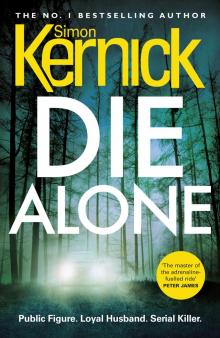 Die Alone
Die Alone Deadline
Deadline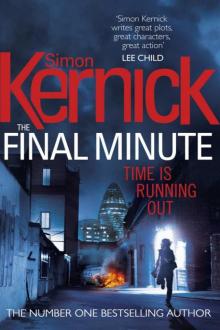 The Final Minute
The Final Minute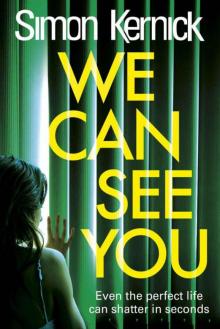 We Can See You
We Can See You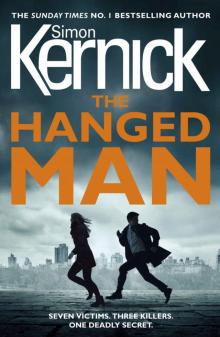 The Hanged Man (Bone Field 2)
The Hanged Man (Bone Field 2)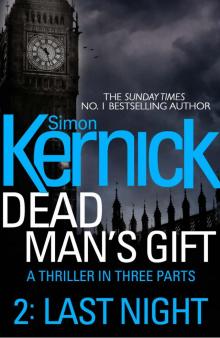 Dead Man's Gift 02 - Last Night
Dead Man's Gift 02 - Last Night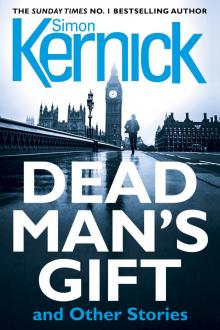 Dead Man's Gift and Other Stories
Dead Man's Gift and Other Stories A Good Day To Die
A Good Day To Die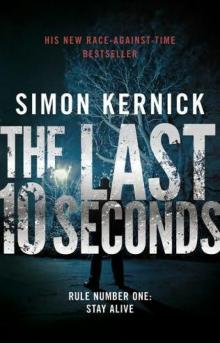 The Last 10 Seconds
The Last 10 Seconds The Murder Exchange
The Murder Exchange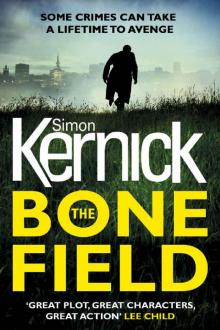 The Bone Field
The Bone Field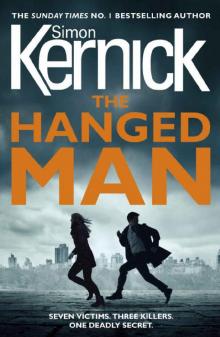 The Hanged Man
The Hanged Man Target
Target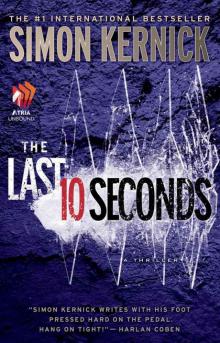 The Last 10 Seconds: A Novel
The Last 10 Seconds: A Novel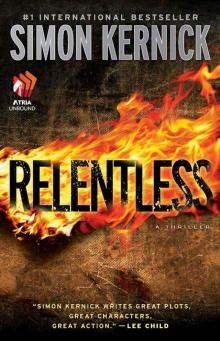 Relentless: A Novel
Relentless: A Novel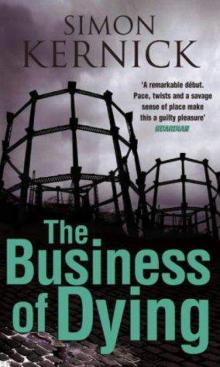 The Business Of Dying
The Business Of Dying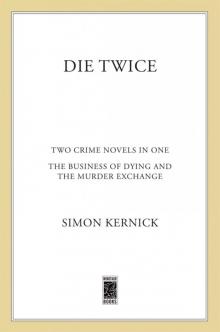 Die Twice
Die Twice Flytrap
Flytrap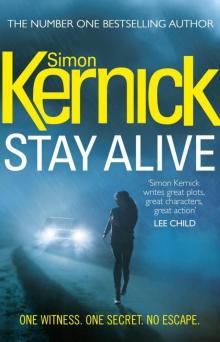 Stay Alive
Stay Alive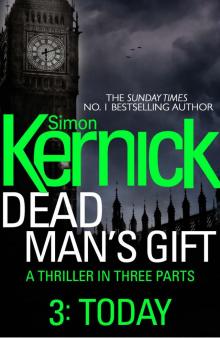 Dead Man's Gift 03 - Today
Dead Man's Gift 03 - Today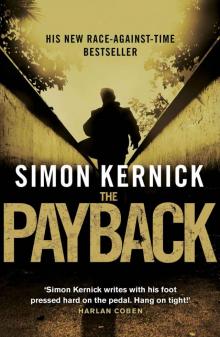 The Payback
The Payback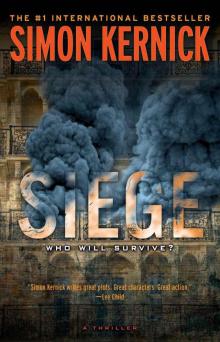 Siege: A Thriller
Siege: A Thriller The Crime Trade
The Crime Trade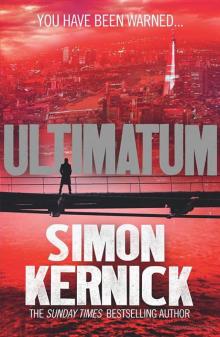 Ultimatum
Ultimatum